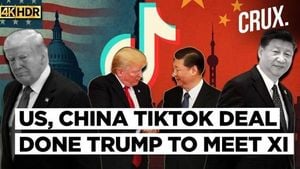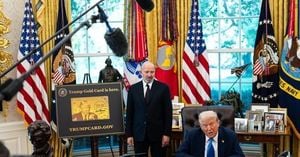The technology battleground between the United States and China continues to heat up, as tensions surrounding the semiconductor industry escalate with fresh sanctions looming. Major players like Nvidia are not just sitting on the sidelines; they're actively engaging with Chinese officials in efforts to navigate this complex environment. The backdrop to these negotiations is the U.S. government's move to impose strict limits on chip exports to China, aiming to curb the country's technological advancement and security threats.
Recently, Nvidia's global business head met with Wang Shouwen, China’s top trade negotiator who previously played significant roles during former President Trump's administration. This high-level meeting reflects both companies’ struggles amid the tightening U.S. trade restrictions and highlights China's desire to maintain its foothold within the tech sector.
Wang expressed optimism about creating a more open market for foreign companies. He emphasized the need for collaboration, stating, "We’re willing to strengthen communication and iron out differences so we can put U.S.-China economic ties back on track." Notably, he highlighted the potential opportunities for foreign enterprises within China as the nation aims for more substantial technological growth.
At the same gathering, Nvidia's Puri mentioned the company’s commitment to China, emphasizing its important role as a market for Nvidia’s advanced technology. The discussions included focusing on how Nvidia can provide high-quality products and services, especially as China pushes to advance its digital economy.
The urgency of these discussions is underscored by recent developments from Taiwan Semiconductor Manufacturing Company (TSMC), which halted the supply of AI chips to Chinese clients, particularly affecting firms like Huawei. This situation marks significant deterioration, as US sanctions continue to cloud the semiconductor horizon, limiting Chinese firms’ access to cutting-edge technology.
This shift has left many Chinese tech firms reeling. TSMC's decision came after its chips were discovered within Huawei devices. Such moves hint at the intensifying scrutiny the U.S. is placing on Chinese companies and their access to semiconductor technology, raising alarms over the state of China’s burgeoning tech industry.
On the U.S. side, policymaking has been reactive to the concerns of national security. The Biden administration's approach has harbored stringent export controls, especially focused on semiconductor manufacturing, aiming to stifle China’s growth. This is part of broader efforts to hinder Beijing's ambitions, especially under initiatives like Made in China 2025, which aims to achieve self-sufficiency and supremacy across several high-tech sectors.
Experts argue these sanctions are set to reshape the global semiconductor supply chain, with companies faced with difficult choices about their international collaborations. The impact could lead to fragmented global markets, as countries may pivot to support local industries for national security reasons, making it increasingly difficult for companies like Nvidia and TSMC to navigate their supply chains effectively.
Prominent analysts warn these developments could accelerate the decoupling trend between Washington and Beijing, impeding technological cooperation and prompting companies to rethink operations. The reality is, as the competition heats up, the two nations might find themselves on parallel tracks away from the previous integration - where American technology plays a significant role within China’s development and vice versa.
Nevertheless, some experts remain hopeful, emphasizing cooperation over conflict—the need for international businesses to encourage dialogue to soften tensions. Chinese officials like Wang have made it clear they are willing to open discussions and explore potential mutual benefits. Still, this collaborative spirit necessitates both sides being open to compromise and adaptation.
While companies like Nvidia pursue avenues to tread carefully through such turbulent waters, the future remains uncertain. The pressures of national security concerns against the backdrop of corporate interests create complex dynamics affecting technological progress and international trade relations. What lies next may hinge upon how nimble corporations can be amid sudden shifts from both government and market fronts.
To summarize, the U.S.-China tech tensions exert mounting pressure on both nations' semiconductor industries, with Nvidia attempting to maintain operational fluidity as bans and sanctions threaten to wall off markets. Meetings such as the Nvidia-Wang engagement represent the thin line companies must walk to safeguard their interests yet navigate the turbulent geopolitical waters. Amid the storm of restrictions, both nations need clarity and constructive dialogue to pave paths forward, balancing economic vitality with national security aspirations.



